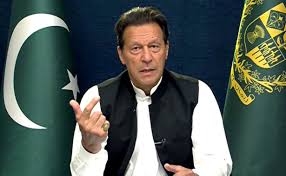By M A Hossain
In a dramatic turn of events, the Islamabad High Court (IHC) on June 3 acquitted the founder of Pakistan Tehreek-e-Insaf (PTI), Imran Khan, and former foreign minister Shah Mahmood Qureshi in the much-hyped cipher case while terminating their imprisonment sentences. The former prime minister has been acquitted of all charges in another two cases related to long march vandalism, leaving the nation in shock and raising questions about the role of external forces in his ousting. Now, Pakistan can take pride in its independent judiciary and serve as an example for its neighbours to follow. This verdict is a testament to the country’s sovereignty and the upholding of national dignity.
The ousting of Imran Khan from power was not merely a domestic affair. Leaked documents suggest that the Central Intelligence Agency (CIA) had a vested interest in destabilizing Khan’s government. Khan’s stance on regional issues, including his opposition to certain CIA-backed operations, made him a target. The agency allegedly orchestrated a campaign to undermine his leadership through false corruption allegations, painting him as a villain for Pakistan’s economy. Khan’s visit to Russia shortly before Russia’s invasion of Ukraine further disappointed the West, leading to his removal. This incident underscores the lengths to which external forces might go to manipulate political outcomes in other sovereign nations. The Pakistani people were left questioning the integrity of their political system, and Khan’s removal was seen as a direct affront to the country’s autonomy.
The Pakistani judiciary’s handling of Imran Khan’s case stands as a testament to its independence. Despite external pressures, the court meticulously examined the evidence, ensuring a fair trial. The verdict sends a powerful message: justice prevails over political manoeuvring. This decision reaffirms the judiciary’s commitment to upholding the rule of law, demonstrating that no external or internal agency can undermine judicial power. The people of Pakistan now have renewed faith that justice, not political gamesmanship, will guide national proceedings. This moment is pivotal for Pakistan’s legal system, showcasing its ability to resist external influences and operate impartially, ultimately strengthening the country’s democratic framework.
Comparing Imran Khan’s trial to former President Donald Trump’s trial proceedings in the United States reveals stark contrasts. While Khan’s case followed due process, the Trump trial faced criticism for its perceived bias and political motivations. The term “kangaroo court” gained traction, highlighting the flaws in the American judicial system. The latest conviction of Trump shocked people worldwide, illustrating how the USA’s judiciary could be perceived as turning into a kangaroo court. Many viewed the motives behind this conviction as an attempt to bar Trump from the presidential race, suggesting the whole judicial proceeding was politically motivated and biased. This comparison highlights the discrepancies in judicial practices between the two nations and serves as a reminder of the necessity for legal systems to operate without political interference.
From history, it is evident that the supremacy of the West, especially the USA, is descending, resembling the fall of the USSR. Symptoms are already exposing themselves. After the USSR’s defeat in Afghanistan, its economy and military power were questioned. Federal states lost hope and aspired to be independent. Moreover, the Chernobyl disaster explicitly exposed the disarray of internal management. Ominous signs are already sighted in the USA during the Covid-19 pandemic. The pandemic has exposed the mismanagement of the USA’s internal system. Another debacle for the USA and its Western allies in Afghanistan, Iraq, and Syria has caused tremendous economic setbacks for the USA. Internal political rifts in the USA are widening more than ever before. The allies of the USA now contradict on many issues, such as arbitrary military or economic punitive measures or tilting towards Russia and China.
Beyond Khan’s acquittal, this case reflects broader geopolitical shifts. The USA’s influence in South Asia is waning. Traditional power centres are recalibrating as China and Russia assert themselves. Economic ties, regional alliances, and strategic interests are evolving. Imran Khan’s exoneration serves as a litmus test for the changing dynamics, signalling a shift away from Western dominance. The Pakistani establishment must feel the pulse of shifting political dynamics in this region. Their recalibrated foreign policy could bring stability in domestic and international affairs. As Pakistan and other South Asian countries reorient their alliances and strategies, the balance of power in the region is shifting. This change underscores the decline of Western influence and the rise of new geopolitical players, emphasizing the importance of regional self-determination and resilience against external pressures.
In conclusion, Imran Khan’s acquittal reverberates far beyond Pakistan’s borders. It symbolizes the struggle for judicial independence, exposes external interference, and mirrors the global realignment of power. As the world watches, it becomes evident that the old order is giving way to new players, reshaping the geopolitical landscape. This verdict not only vindicates Khan but also serves as a beacon for nations striving to maintain their sovereignty in the face of external manipulation. It marks a pivotal moment for Pakistan, demonstrating its judiciary’s strength and the country’s resilience against foreign intervention. The broader implications of this acquittal signal a transformative period in global politics, where new alliances are forged, and traditional power structures are challenged. As these dynamics continue to evolve, the world must pay close attention to the emerging balance of power and the growing assertion of national sovereignty across the globe. (IPA Service)


